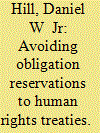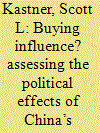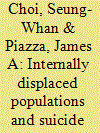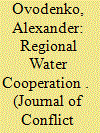|
|
|
Sort Order |
|
|
|
Items / Page
|
|
|
|
|
|
|
| Srl | Item |
| 1 |
ID:
147699


|
|
|
|
|
| Summary/Abstract |
This article examines the decisions of governments to enter reservations upon ratification of international human rights treaties. I argue that, in the context of the human rights regime, reservations are simply attempts to avoid international legal obligations where they would be consequential. I develop an explanation for their use that focuses on the following two factors: the legal constraints that already exist in domestic law and the likelihood that international agreements will be enforced by domestic courts. Using an original measure of domestic legal protection of civil, political, and personal integrity rights, I find evidence that governments are more likely to enter reservations when domestic legal standards are lax compared to those in the treaty and when judiciaries are likely to enforce treaty-based obligations. This suggests that full adoption of international human rights treaties is more likely when treaties will not create genuine domestic legal constraints and that explanations for treaty adoption and implementation must take reservations into account. It also suggests that adoption of international human rights law is best explained by the specific legal institutions that relate to domestic enforcement rather than broad distinctions between democratic/autocratic political institutions.
|
|
|
|
|
|
|
|
|
|
|
|
|
|
|
|
| 2 |
ID:
147696


|
|
|
|
|
| Summary/Abstract |
Across one longitudinal and two cross-sectional surveys in Northern Ireland, we tested a model of intergroup relations in which out-group attitudes and behavioral tendencies are predicted by cross-group friendship and positive intergroup appraisals, mediated by intergroup emotions and out-group trust. In study 1, out-group friendship at time 1 predicted out-group trust at time 2 (one year later), controlling for prior out-group trust. In study 2, positive and negative intergroup emotions mediated the effects of friendship on positive and negative behavioral tendencies and attitudes. In study 3, a confirmatory factor analysis indicated that trust and emotions are distinct constructs with unique predictive contributions. We then tested a model in which cross-group friendship predicted intergroup emotions and trust through intimate self-disclosure in out-group friendships. Our findings support an integration of an intergroup emotions framework with research highlighting the importance of cross-group friendship in fostering positive intergroup outcomes.
|
|
|
|
|
|
|
|
|
|
|
|
|
|
|
|
| 3 |
ID:
147694


|
|
|
|
|
| Summary/Abstract |
It is widely believed that China’s growing links to the global economy are translating into increased Chinese political influence abroad. This article explores this possibility quantitatively by examining whether increased trade with China correlates with an increased willingness by countries to accommodate Chinese interests. I use newly collected data that capture cross-national variation in the willingness of individual countries to support Chinese government positions relating to Taiwan and Tibet, and China’s status as a market economy. I find that increased trade dependence on China is correlated with an increased likelihood of taking an accommodating stance on the economic issue (market economy status). But the evidence linking trade to an accommodating stance on the political issues is more ambiguous.
|
|
|
|
|
|
|
|
|
|
|
|
|
|
|
|
| 4 |
ID:
147698


|
|
|
|
|
| Summary/Abstract |
In canonical accounts of war, conflict outcomes are inherently uncertain. Contesting literatures posit that this uncertainty, arising from stochastic elements of the war-fighting process, may induce conflict due to greater risks of miscalculation or foster peace by breeding caution. We theorize that states, on average, exhibit prudence when confronting greater uncertainty. Despite its conceptual importance, extant proxies for uncertainty at various levels of analysis—such as polarity, balance of power, system concentration, and dyadic relative capabilities—are imprecise and theoretically inappropriate indicators. To overcome this shortcoming, we theorize the conditions that elevate the magnitude of uncertainty over conflict outcomes and introduce a novel measure that captures this uncertainty within any k-state system. Through extensive empirical analysis, we confirm uncertainty’s pacifying effect and show how this effect operates at different levels of analysis
|
|
|
|
|
|
|
|
|
|
|
|
|
|
|
|
| 5 |
ID:
147695


|
|
|
|
|
| Summary/Abstract |
This study asserts that countries with large internally displaced populations (IDPs) are more likely to experience a higher rate of suicide terrorism. After demonstrating this, the study tests four intervening factors hypothesized to drive the relationship between IDPs and suicide attacks: IDPs are expected (1) to increase the pool of potential suicide recruits, thereby lowering the labor costs for suicide terrorist groups; (2) to increase local ethnic conflicts that foster a favorable environment for suicide terrorism; (3) to worsen the human rights conditions in countries, prompting aggrieved people to support suicide terrorist tactics; and (4) to raise the counterterrorism and policing costs of the state, enabling terrorists to plan and execute suicide attacks. Results from negative binomial regression and Tobit models show evidence for the IDPs-suicide terrorism connection. When recursive models are employed to evaluate the effects of four intervening variables, the results most consistently support human rights violations as a significant and substantive mediator between IDPs and suicide attacks.
|
|
|
|
|
|
|
|
|
|
|
|
|
|
|
|
| 6 |
ID:
147697


|
|
|
|
|
| Summary/Abstract |
Shared water has prompted some neighboring countries to form integrated regional institutions and rules. Other neighboring countries have maintained less cooperative policies in managing shared water. When do governments achieve integrated management of regional water? How do they overcome barriers to integrated cooperation? This article contends that the structure of interdependence, not the number of states bordering the water, encourages different international policies. It analyzes original panel data on the agreement histories of seventy-six rivers, lakes, and seas. It also examines the role of selective incentives in promoting mutual water management. Fundamentally, the number of states with access to the water does not determine the fate of water management. Strategies for overcoming divergent preferences can be applied across situations. The key is to provide selective incentives when states are asymmetrically interdependent in using the water, to alter national preferences. Selective incentives are particularly important when few states share the water.
|
|
|
|
|
|
|
|
|
|
|
|
|
|
|
|
|
|
|
|
|